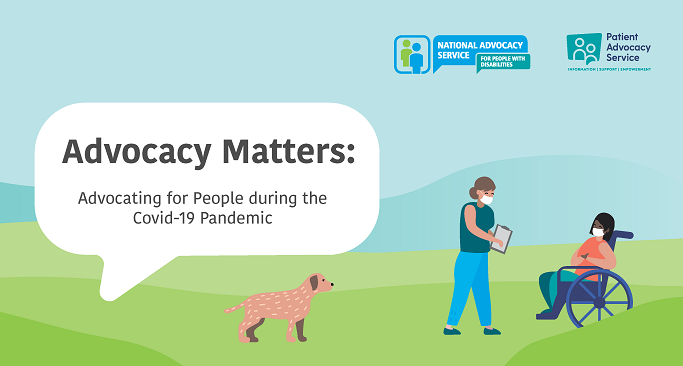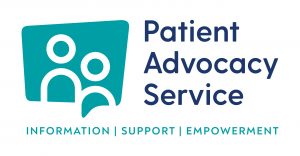
Many people using health and social care services in Ireland, including public acute hospitals, community services and nursing homes, have dealt with traumatising experiences due to the restrictions and disruptions caused by the impact of the Covid-19 pandemic.
Given the ongoing impact of the Covid-19 virus, it is crucial that health and social care services learn from people’s negative experiences, using their feedback to continue to improve their service delivery. This will ensure these services are better prepared to respond to future challenges that Covid-19 could bring.
These are among the key findings in two new reports, titled ‘Advocacy Matters: Advocating for People during the Covid-19 Pandemic’, developed by the National Advocacy Service for People with Disabilities (NAS) and the Patient Advocacy Service.
The first report (open Report / its Executive Summary / Easy-to-Read Version) explains the issues faced by people in relation to health and social care during the Covid-19 pandemic. It focuses on the Services’ advocacy for people attending acute public hospitals and for people with disabilities using social care services.
The second report (open Report / its Executive Summary / Easy-to-Read Version) outlines the issues people experienced in relation to restrictions in nursing homes during the pandemic. It explains the Services’ support for residents dealing with issues such as communication and visiting, infection control and isolation.
The ‘Advocacy Matters’ reports focus on the independent advocacy work carried out by NAS and the Patient Advocacy Service during the period March 2020 – March 2021. They outline the experiences of the people supported by the Services, the support the Services provided, and the positive outcomes the Services’ helped to achieve.
The reports show the key role that advocacy plays in supporting people who may be vulnerable in Irish society, particularly during periods of crisis.
Louise Loughlin, National Manager of the National Advocacy Service for People with Disabilities (NAS) said: “The Covid-19 pandemic, its restrictions and the subsequent disruptions to health and social care services in Ireland have led to traumatising, life changing experiences for many people in Ireland, including those supported by NAS and the Patient Advocacy Service.
“It is crucial that health and social care services listen to people’s views and negative experiences about their care, using them to review and continue to improve their service delivery. This will help them adapt to any future challenges arising from the Covid-19 pandemic.”
- Key findings from the report on ‘health and social care’:
NAS and the Patient Advocacy Service have provided advocacy for people facing a range of complex, difficult and stressful issues in healthcare settings. Advocates have ensured people’s voices have been heard and they have had fair treatment and access to services.
Several people contacted the Patient Advocacy Service who felt that their own discharge, or that of family members, from hospital was rushed, unsafe and carried out without discussion. The Service was also contacted by people with Covid-19 who were being discharged home into the care of at-risk family members without any community or primary care support packages in place.
Advocates have supported people who raised concerns around the level of infection control measures in place for people who have been moved between wards during their time in hospital. Some people who did not have Covid-19 have found themselves placed in wards where there have been confirmed Covid cases, or where there have been other people awaiting Covid test results.
The lack of communication with families whose loved ones contracted Covid-19 while in hospital has been a repeated concern. Almost 40% of people who contacted the Patient Advocacy Service during the Covid-19 pandemic had difficulty communicating with healthcare units. They said they were unable to get a response to their phone calls, or their phone calls were not being returned. Some families were unaware of a Covid-19 diagnosis.
Both NAS and the Patient Advocacy Service have supported people in acute hospital settings who were awaiting discharge home or to more appropriate supports. At the beginning of the pandemic, people were moved quickly from hospitals to ensure acute hospital capacity for Covid affected patients. This has resulted in people moving to placements that they did not want to live in as they had no alternative options.
Regarding social care, home care packages for people with disabilities, designed to facilitate them to live as independently as possible, were affected. In the early months of the pandemic, home care packages were reduced, curtailed or at times stopped. Many people were reassessed to determine whether they required the same number of hours provided before Covid-19.
When it came to personal care, NAS received several calls from people whose personal assistant service providers decided to pause services or reduce the hours provided during the Covid-19 pandemic.
There were also issues around primary care supports such as home support service, which provides personal care support for people, for example to get out of bed, dressing and undressing and taking a shower. For some people with disabilities there was a difficulty with accessing GP appointments, as many GPs moved to remote consultations and some people found that virtual appointments did not meet their needs.
- Key findings from the report on ‘nursing homes’:
People living in nursing homes have faced the most extreme restrictions in society, with some people had to stay in their rooms 24 hours a day during certain periods of lockdown, with no access to friends or family.
Due to staffing issues, many people have not been able to receive the care, information and reassurance they needed from nursing home staff. This has resulted in people feeling isolated, fearful and unsure of what was happening in their nursing home and the outside world.
At the beginning of the pandemic, a lack of information, technology and safe spaces impeded communication between the Services’ Advocates and people living in nursing homes. This was particularly concerning at a time when people had already been exposed to challenging circumstances and events beyond their control.
Some families told our Services they had no way of communicating with their loved ones and no way of knowing if they were safe from the virus or not. They found it very difficult to get updates from nursing homes and were often unaware how serious the outbreak was within the nursing home.
NAS and the Patient Advocacy Service have worked with families who did not get to see their loved ones before they passed away and were left with the worry that they died alone and scared. Many of these families have expressed their feelings of guilt for not being able to do more and not knowing how seriously ill their loved ones were.
NAS and the Patient Advocacy Service were also told that some nursing homes did not have a clear protocol for managing the virus, while family members also expressed their fears that care plans were not being followed. Families also raised concerns about Personal Protective Equipment (PPE) availability and usage.
Advocates have continued to provide support for people living in nursing homes and their families, working to ensure meaningful communication and visits could take place, checking in regularly with the people they support to maintain contact to reduce the isolation they felt, raising any concerns and visiting people when it was possible.
NAS has been aware for several years of the number of people under 65 living in nursing homes. As nursing homes are primarily designed for older people, many people under 65 did not want to live there. NAS has advocated on behalf of these individuals for many years.
During the pandemic, people under 65 reported to our Advocates that social workers or discharge coordinators from hospitals helped them to sign up to the Fair Deal scheme for nursing homes without alternative options being discussed or knowing the long-term consequences. NAS ensured they were able to explore their options to make a choice about where they live.
- Key Recommendations from the reports:
Given the ever-changing situation with Covid-19, it is crucial that health and social care services review and continue to improve on their service delivery, adapting to the evolving situations arising from the ongoing pandemic. These services should also take into account the experiences of people supported by NAS and the Patient Advocacy Service, along with the learnings of our Advocates, to improve service delivery.
In line with the HSE’s ‘Your Service Your Say’ complaints process and the ‘Incident Management Framework’ for patient safety incidents, learning should be drawn from the experiences and feedback of the people using health services. Their recommendations should be implemented to improve service delivery. It is crucial that people are supported to have their voice, will and preference heard and are included in decisions that impact on their lives.
Improvements should be made in acute hospitals to make sure their environment, processes and systems work effectively to ensure patient safety and build on the safe and effective care already being provided.
Home care provider services should have plans in place to ensure continuity of services during times of crisis, while home support services should be regulated under a set of national standards that will improve the supports provided to people living in the community.
People who are inappropriately placed in acute hospitals on a long-term basis should be supported to move to more appropriate settings in line with their will and preference. In addition, hospitals and home care providers must work together to ensure people have adequate supports in place when being discharged back into the community.
There should be increased government funding for alternatives to nursing homes such as rehabilitation, supported accommodation and home care hours. Less emphasis should be placed on the Fair Deal Scheme, especially in cases following a stay in an acute setting.
It is crucial that the Nursing Home Expert Panel (NHEP) report recommendations are implemented regarding the integration of private nursing homes into the wider framework of public health and social care.
